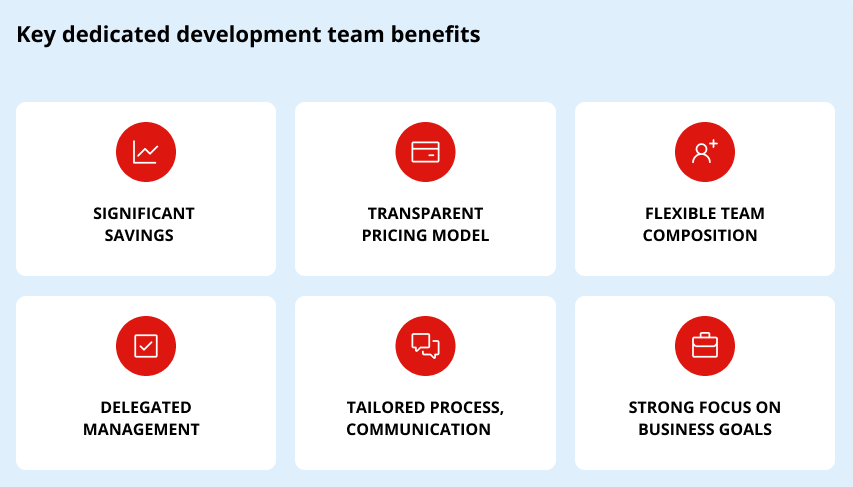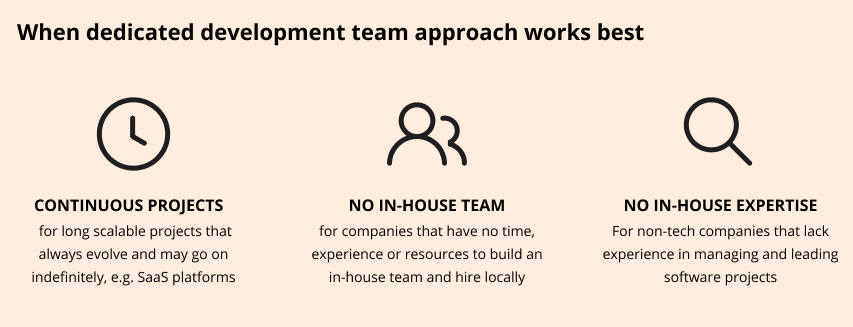Dedicated Development Team Model for Your Business: Definition, Approach, and Benefits
Dedicated team model is a reliable and cost-efficient approach to outsource a whole or a part of your product development. It works well for different types of projects from scaling large web platforms to building an MVP from scratch. If you consider this approach and want to learn if it’s a good fit for your project, this guide is for you.
In this article, we will walk you through:
- Common dedicated team definition and the basics of this model.
- Key benefits of a dedicated team model for your business.
- Real-world examples where this approach works best and where it fails
- Disadvantages of the dedicated team model to consider before choosing it.
- Steps to take to build a successful dedicated development team.
So what is a dedicated team model? A dedicated software development team is a group of remote specialists that you hire to design and build a new system or contribute to your ongoing project. This team is officially employed by your tech vendor and, in most cases, works exclusively on your project. As a rule, a dedicated development team structure includes different roles (e.g. UX/UI designers, project managers, BA, frontend and backend developers, data scientists, QA and DevOps) and may be tailored depending on changing project requirements and phase.
Unlike the staff augmentation strategy, which basically means adding talent to an existing tech department to fill in a skill gap or scale up the team, dedicated software development team model is a more holistic and business-oriented approach. As the name suggests, the team is dedicated to one client and has one set of business objectives in mind — your business objectives.
Moreover, this approach is often more time-efficient compared to hiring an in-house team locally. It usually takes less time for a vendor to put together a cross-functional team using their resources than for a company to recruit, onboard and train a full-on in-house team.
And benefits of outsourcing a dedicated team model only start here.
Significant savings
Cost-efficiency is the main reason for outsourcing software development team. And this advantage works on two levels.
First, there’s a large gap between rates and salary expectations in different locations. Even if we talk top-tier engineers only. So if you operate in the regions where the rates for skilled tech talent are the highest (the US, UK, Western Europe, Australia), you can cut your expenses up to three times by delegating projects to dedicated development teams in proven outsourcing locations (Poland, Czech Republic, etc.).
Secondly, this approach allows you to reduce legal and administrative costs. Your vendor takes responsibility for all employment expenses, including employee benefits, infrastructure, equipment, licenses, office and workspace setup.

Transparent pricing model
Straightforward pricing model and transparency are great advantages of the dedicated team model. Typically, you will pay the same amount for a selected period, e.g. monthly, and cover the team’s salaries and provider’s fees. The amount is predictable — it depends on team composition, tech stack, and complexity. It is generally tied to the provider’s rates and agreed upon at the beginning of cooperation. Provider’s fee includes infrastructure costs.
Flexible team composition
Flexibility is one of the biggest benefits of building a dedicated team with a tech partner. It is also often the reason why companies that originally don’t have in-house tech teams or access to skilled talent prefer this model. The thing is, in many cases, clients don’t even know what specialists they need.
From the very beginning, a vendor, having studied project requirements and goals, suggests an optimal dedicated project team structure — e.g., a project manager, UX/UI designer, frontend developer, backend developer and a QA specialist. Classic. However, as the project evolves it may require new competence or extra manpower. In this case, a service provider can leverage their resources and quickly ramp up the team. So for example when you need to find and hire .NET developers to extend your backend team fast, your vendor can find the right people for the job within weeks compared to months you would have spent looking for quality candidates to hire in-house.
Bridge talent gap and speed up time-to-market
Hire an experienced dedicated web development team to solve your tech needs.
HIRE DEDICATED TEAMDelegated management
This is another reason why many companies that have neither technology expertise nor experience in managing IT projects opt for this model. Not only can a vendor put together a full-stack team but also lead and coordinate it every step of the way. In practice, dedicated product teams can take over a project at an idea stage, select technologies, work out an effective development strategy, implement it and deliver a functional product in the end.
These dedicated project team’s advantages are equally true for the companies that do, in fact, have project management on their end and prefer to have more control over the progress and overall implementation. It’s not unusual, for example, to have a product team and tech leadership on a client’s side and a project manager or Scrum master in a dedicated team.

Tailored process and communication standards
One of the most important dedicated project team advantages is adaptability in terms of process and communication. It’s worth mentioning that if you work with a vendor who has been on a market for some time, you can expect the team to already have a time-proven process and standards in place. However, this doesn’t mean that these settings will be imposed on you.
On the contrary, your service provider will work out a communication framework and process that would sit well with your practices and needs. Since your dedicated team works in large part on their own and a great deal of communication is on a project manager or Scrum master, you will unlikely have any communication friction. Even if you work in different time zones.
Strong focus
Though we mention it in the end, this is perhaps one of the most attractive dedicated development team benefits from a business perspective, especially for long-term projects.
As a rule, a dedicated team works on your project and your project only. Naturally, a fully invested team develops a deep understanding of your business and domain, knows the market, competition and technologies inside and out. It impacts performance, speed and overall product strategy.
Example: A dedicated application development team at Digiteum has been working on a web system for Printique photo lab for more than a decade. We set off with only 4 engineers responsible for the redesign and development of a web application for photographers and soon grew into a solid dedicated team of 20+ engineers continuously working on the client’s digital infrastructure and services. Over these years, the team has gained such profound domain expertise that allows us to not only ensure the client’s superior online services and technical excellence but also drive innovation and contribute to the company’s evolution and business growth.
As with any other outsourcing strategy, this model comes with its own drawbacks. Along with common challenges that may arise from friction during remote work or delays in communication, there are several dedicated team disadvantages to consider before opting for this approach. Let’s see.
Takes more time and effort to set up
Naturally, it takes more time to set up and build a well-oiled squad than to add a specialist to an existing team. More so, it requires effort on your end, especially at the beginning, to organize knowledge transfer and make sure your remote team understands your business and your goals. But despite the challenges in creating a dedicated team, this effort pays off.
Less flexible compared to outstaffing
Outstaffing is very flexible. It allows you to scale your development resources up and down very fast. Dedicated team is also flexible, especially if you work with a resourceful partner able to quickly adjust to your changing needs. But dedicated team is a team, so a significant change in team composition or headcount may take more time and adjustments.
Loss of expertise after the end of collaboration
Dedicated team is fully invested in your mission and your goals and over time develops unique business and domain expertise relevant to your project. This is an important benefit of this model but also one of the biggest cons of the dedicated team model. If for some reason collaboration ends, you risk losing valuable expertise, which otherwise you would keep working with an in-house team.
Now that we’ve talked about dedicated project team advantages and disadvantages, let’s see what projects benefit the most from this collaboration model and when it’s best to avoid this approach.
We have already mentioned several use cases when we were talking about the benefits of dedicated team model. Now let’s look into more detail and learn when dedicated project teams work best and why.

Long-term continuous projects
This approach is perfect for long scalable projects that always evolve and may go on indefinitely. So if you work on a SaaS platform or large web application development projects that require continuous support, enhancement and adding new features, you can use the benefits of dedicated teams. Such projects are usually stretched in time, so even partial outsourcing to a dedicated team will bring you significant savings in the long run.
No time/resources to build an in-house team
A dedicated team is a viable substitute to an in-house team for companies that can’t afford or simply don’t have time to hire developers locally. On average, it may take more than three months to put together and organize web development team compared to up to one month offered by a vendor. Not to mention expenses for recruiting, onboarding, and infrastructure setup.
A reliable tech partner can solve these problems. An emerging startup that want to speed time to market and outsource web app development without losing quality as well as established companies that can’t keep up with their innovation agenda, enjoy the benefits of a dedicated project team to hit their delivery goals.
No tech or management expertise in-house
Dedicated development team model works well for non-tech executives and companies that lack experience in managing and leading software projects. In these cases, tech partners set up a dedicated software development team structure and add specialists who can lead and fully coordinate the process. This includes PMs, POs, and Scrum masters, as well as senior tech specialists that can help with strategy on complex software projects, e.g. migration to cloud or getting the benefits of microservices architecture.
Despite all the benefits of dedicated development team, it is not a one-stop solution. Sometimes this strategy won’t beat the advantages of an in-house team. And in other cases, it won’t provide sufficient savings compared to other outsourcing strategies. Here are a few examples:
- Remote work disrupts the project. Sometimes remote collaboration, even though possible thanks to the abundant tools and communication platforms, disrupts the working process and doesn’t let the project progress at the pace it could. This is a case for the projects that require the development team to physically be on-site, collaborate with domain experts regularly, or work with unique hardware that cannot be shipped to other locations.
- A domain is too complex. A handful of projects cannot be delegated to outside providers because domain knowledge transfer is too hard or risky (e.g. relates to national security).
- A project is small and has a tight budget. A dedicated team strategy is usually not the best choice for small 2-3 months projects because of low budget and time constraints.
Let’s assume you consider this model of collaboration and are ready to make the first step. How do you start and what should you expect from your vendor?
Here’s a quick walk-through the process of hiring a dedicated team from our decade-long experience as an IT service provider:
How we build a dedicated team at Digiteum
Step 1. Assess requirements
The first thing we do when we receive a request and talk about a project idea is to assess its potential and feasibility. As a technology provider, we need to understand if an idea is implementable within a given timeframe and, if yes, what it will take to bring it to life. To get all the necessary information, we conduct a series of Q&A sessions with a client and gather requirements, learn about limitations and primary objectives.
Step 2. Define scope and required resources
At this step, we engage BA and project managers as well as leading tech specialists to estimate resources, define scope and timeline, analyze risks and work out team composition.

Step 3. Set up the team
Once we have a go, we start setting up the team depending on the project schedule and roadmap. Normally, we can kick off from the research and design phase within only 2 weeks and put together a basic cross-functional team in as soon as 1 month.
Step 4. Scale up or down on demand
When we work on dynamic projects with changing requirements and scope, we often need to modify team composition, add competence and engage new specialists to cover ongoing needs. Depending on the exact needs, we either engage available engineers we have onboard or conduct interviews and recruit new talent specifically for the project.
Cut development costs without losing quality
Leverage the pros of the dedicated team model to meet your budget and delivery goals.
HIRE DEDICATED TEAMDedicated team structure
The composition of an outsourced dedicated development team is determined by project phase, scope, tech stack, volume, management model, and overall development strategy. Generally, a long-standing technology provider can set up a team with diverse competencies and roles. Depending on project specifics and requirements for dedicated developers, team structure may include the following roles:
- Business: Business Analyst, UX Expert
- Design: UX/UI Designer, Product Designer
- Management: Project Manager, Scrum Master, Product Owner
- Architecture: Software Architect, Lead Engineer, Tech Lead
- Engineering: Frontend, Backend and Full-Stack Engineers
- Big data: Data Engineer, Data Scientist
- Quality assurance: Manual and Automation QA Engineers
- Infrastructure: DevOps Engineer
Advantages of a dedicated team approach at Digiteum

Digiteum is a trusted technology provider for companies like Oxford Languages, Printique and Diaceutics. Over the years of working with enterprise-level brands and perspective startups, we have worked out a solid approach to building reliable and performing dedicated software teams.
“Business understanding creates great software”
All our specialists are trained to keep a strong focus on the client’s business goals and perform with short-term and long-term business objectives in mind. This helps us suggest better solutions, hand-pick technologies and tailor strategies that would bring more value from a business perspective.
Pragmatic approach and timely delivery
Fast time to market is crucial for many projects. We believe that it’s essential not to overpromise but to set realistic expectations and always deliver on time.
High quality of delivery
High quality of output and smooth deliveries are the pillars of trust between a client and a vendor. This is why we promote the culture of tech excellence and pixel-perfect design among our specialists and make sure it translates into the quality of the software we build.
Contact Digiteum
Summary
Dedicated teams model is a practical alternative to an in-house software team. It is a cost-efficient solution for companies looking for long-term tech partnerships and a proven strategy to outsource end-to-end software product development.
If you need to get a dedicated team of developers and want to hire a nearshore outsourcing web development firm, contact our team. We are a cross-functional full-stack software development company with a wide range of skills across web development (app development services with React.js, Angular development services, .NET development services, Java development services, etc.), mobile (iOS and Android), IoT software development, big data development.
This post was originally published on March 13, 2022 and updated on March 27, 2023.
FAQ
- Cost-efficiency
- Faster time-to-market
- Focus on business goals
- Flexible team composition
- Easy scale-up
- Access to tech talent
- We start with a series of Q&As and workshops with the client to gather requirements, set a timeframe and assess project potential and feasibility.
- Define scope, estimate resources and work out team composition.
- Set up the team depending on project roadmap and timeline.
- Ramp up/down on demand as the project evolves and requires additional resources/new competencies.








